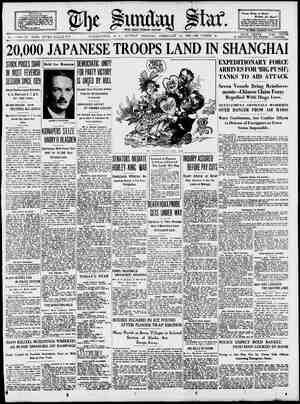Evening Star Newspaper, February 14, 1932, Page 73
You have reached the hourly page view limit. Unlock higher limit to our entire archive!
Subscribers enjoy higher page view limit, downloads, and exclusive features.
Features ArtNotes }'\RI 7. he Swndy Shat Magasine WASHINGTON, D. C. FERBRUARY H, 1932. rFiction Bridge 20 PAC 'I"S Britain’s Call to Youth With the Prince of W ales Leading the Appeal, England Is Setting Out to Rally Its Youth to a New Standard of Service— Hoer C)flziml Post- 11 ar Youth, Flouting the Island’s Traditions, Has Become One of Her Great Problems. | Ilustrated by 4DDiSON BURB ANK. “Fathers talk about the beauties of ambition and hard work—but Yout? seys, ‘W hat’s the use?’” By C. Patrick Thompson NGLAND has been worried about her younger generation, very wor- ried. So two weeks ago she issued a great call to youth. The sound- ing board was London’s biggest hall, and the radio, the “talkies” and the newspapers carried the reverberations to every corner of the island. Only one man could put that call over as it had to be put if it was to catch all ears and register on the minds served thereby. Young England would have laughed at Bernard Shaw, discounted the vehement empire-crusader, Lord Beaverbrook; booed the millionaire press lord, Rothermere. Winston Churchill is too class-oriented and would have put youth’s back up; and youth would have thrown old tomatoes at his complacent son, Randolph. Oswald Mosley would have received a whole aviary of birds, Ramsay MacDonald would have touched no young heart (his oratory is for middle age) and Stanley Baldwin, though hon- est and blunt, is a party politician and arouses no large enthusiasm in the breast of youth; while his cousin, Kipling, once youth’s idol, is uninspiring in the flesh and in these days appeals only to the young of the jingo and vested imperial interests classes. The Prince of Wales had to do it. He is the one person in the island everybody listens to, approves and exempts from any suspicion of having an ax of either party, private interests, politics or per- sonal prejudice to grind. And the Prince of Wales did it. It was a difficult task, and it was made still more difficult by the heckling of a group of women who greeted the Prince’s ref- erence to British interests abroad with shouts of “Withdraw the forces from India!” BUT the Prince put it across. He called upon the 10,000 boys and girls packed into Albert Hall, in London, and the hundreds of thousands more who sat by their radios throughout the island to end the depression by ending apathy. “Depression and apathy are the devil’s own—they’re not English!” he cried. “Away with them!” And the vast hall rang with youthful cheers. It was a personal plea from the Prince of Wales to England’s youth; and the Prince brought himself, his own oppor- tunities, his own efforts, his own failures —into that plea. “As far as my part is concerned,” he said, “many paths in life are closed to me. Much I would like to do that I can- not. But I have tried to bring more closely together the people of the em- pire, to bring more closely together the English-speaking peoples and to further our interests abroad. I have had my failures, I know, but in these years, with few precedents to guide us, to have no failures is to have attempted nothing.” WIill youth accept that challenge? It is too early to tell. The call may have sunk like a stone tossed into a pool, sending out ripples which presently smooth out and leave the pool calm as it was before. On the other hand, it may—to ehange the metaphor—have scattered over fer- tile soil seeds which will germinate and fructify mightily in the days to come. This youth business is a world phe- nomenon. But since we are hese dealing with the British aspeet of it, we may sus- vey i from the island angle. England has been through a tough and demoralizing phase. ¥he war bred cynicism and laek of fajth in traditions, ideals, everything. It robbed Britein of a million men, the flower of jer young manhood. It made women apoil hoys and youths in the post-war years. Ehe churches lost their hold on the young “Debunking” became the favorite yamth sport of the day. England has been without rallying points and opportunities for youth 0 find a vent for #s animal spirits and energies. There have been attempés # form branches of the political parties— Young Tories, Young Liberals, Young Socialists. All have been a joke. Poli- tics in England since the war have be- come too discredited, and Parliament it- self, until recent events, had lost much of its old prestige. For a time i looked as if a leader might rally disgruntled British youth i@ a big and vital political movement. Bu$ esther the right leader was not forthcom- ing or British youth has no real ambi- tions in that direction. Sir Oswald Mosley showed how the wind blew there. He has been a young maa in revolt himself, making it hot in Parliament for his father-in-law, the august Lord Ourson, as a critic of foreign licy. Then he split with the Tories went over to the Socialists in an- ticipasion of »apld promotion, and for a . was b0 be heard attacking the and the eapitalistic system which own and his wife's money safe d fruitful. But the Labor old guard suspicious of the sincerity of their vociferous reeruit, and pretty soon, tired of waiting for promotion and disillu- gioned about Labor’s political future, he got out and formed a political party of own, the New Party. was o rally youth against the effete futile old gang of politicians in the Mussolini manner. It had no use politicians anyway, and little use for whieh # dubbed the “Talk keep his and was
